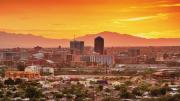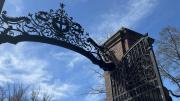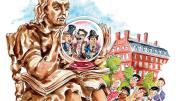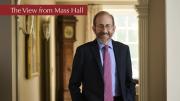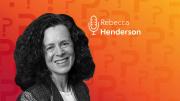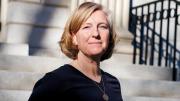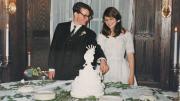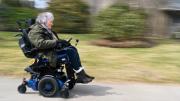At the start of the fall semester, my childhood best friend, Tara, and I decided to take a walk together every week. Our incentive was twofold: the Tucson weather was finally beginning to slither into the 80s—a refreshing change from the brutal 110-degree summer days that had kept us cloistered indoors—and the pandemic doubled our longing for regular physical and social activity. A weekly walk would satisfy both desires.
Our first three walks took place at our elementary, middle, and high schools. As the grapefruit-pink sun slipped behind the Catalina Mountains, we roamed our elementary-school playground and pumped our legs on the swings, recalling our fourth-grade class trip to Tombstone and the annual Scholastic Book Fair, held in the cafeteria. At our middle school, Tara and I circled the cluster of ashy gray buildings, stopping outside the locker rooms to reminisce about the daily terrors of gym class. And at our high school one September morning, we lapped the red-rubber track, gazing at the empty football field and recalling our graduation ceremony, which had taken place on the turf almost four years ago.
“I’m so glad high school is over,” Tara said, pulling out her phone to play Kanye West’s “Good Morning” from his 2007 Graduation album. “Welcome to graduation,” West’s voice crackled through the phone’s tinny speakers. “Good morning.” We both laughed.
In a few months, I will experience a second graduation, from college. The impending jump into the fabled real world seems all the more illusory because I’ve spent the past year simulating my own childhood, even while remaining a Harvard student. At home with my family during the fall, I indulged in youthful pleasures: perusing my old diary entries (“I am so mad today!” I wrote in a spell of fourth-grade frustration, the words slightly smudged from the graphite of the now-obsolete yellow wooden pencil); listening to 2000’s pop music on Spotify (Miley Cyrus was a perennial favorite); playing table tennis and basketball on Wii Sports Resort with my father (my Mii, created when I was 10, still wore the wire-rimmed glasses I donned until middle school).
Reliving my childhood was the opposite of what I’d expected from my senior year. To many students, college is supposed to serve as an exercise in “adulting.” After high school, I couldn’t wait to start: spending summers working and living independently in faraway cities, cooking for myself, learning to file my taxes and invest my income sagaciously. To me, adulting—although conventionally viewed as mundane but necessary—felt riveting.
As a first-year, therefore, I made it my mission to develop some essential skills. I signed up for a freshman seminar on consumer financial protection and purchased Personal Finance for Dummies. I learned about 401ks and Roth IRAs, but as an 18-year-old encountered scant opportunities to put my newly acquired knowledge to good use.
Weeks into first semester, though, I injured my right foot enough that it hurt to walk. Unable to ask for my parents’ help, I was forced to manage my own medical care through University Health Services. My new friends helped, delivering ice and vitamin C boosters to my room and offering to walk me to classes. It was an initial lesson in adulting, and in adult friendships. I relished a new sense of responsibility, and the trust I developed in others to help me when I needed it.
Fueled by my newfound independence, I became determined to spend my first college summer far from home, and earned a reporting internship at ABC News in Washington, D.C. I lived with three roommates in a shoddy George Washington University apartment, where circumstances forced me to behave like a grown-up: scheduling who would take out the trash, wash dishes, and shower first on a given day, and mediating conflicts among roommates that ranged from heated political disagreements to bubbling frustrations over respective living habits. The internship itself was an adulting exercise as I navigated power dynamics with writers, editors, and fellow interns while learning to propose my own stories. When an idea was rejected, I learned not to take it personally—a skill I knew I’d need, inevitably and frequently, as an adult.
Looking back now, though, each subsequent year of college seemed to offer fewer opportunities to practice adulting. Perhaps I’d grown accustomed to what initially felt exhilarating. By sophomore year, I was no longer thrilled to drag a bulbous sack of dirty laundry to the Adams House basement every weekend. At midnight, as I cobbled together cursory drafts of English papers on my laptop, I yearned for someone to tell me to go to sleep. And in the mornings, when I skipped breakfast for a bag of stale potato chips, I wished someone would advise me to make the two-minute trek to the dining hall for some spinach and mushroom quiche. I felt myself cocooning into childhood once more.
This feeling compounded when I chose to spend sophomore summer back home, pursuing an immigration and border journalism fellowship with a few Harvard classmates. The fellowship was in its inaugural year, so there was only limited infrastructure to support us—and ample room for improvisation. My role was “site leader”—responsible for keeping the other fellows on track and organizing group activities. In some ways, it was an exercise in adulting. At the same time, I was skeptical of returning home, knowing that my freedom as an emerging adult would be curtailed by my family’s schedule. Nevertheless, I accepted the opportunity, thrilled by the prospect of covering immigration in my home state.
That summer, I reconnected with childhood friends, including Tara, and inaugurated my twenties at a local restaurant with my family. It was a far cry from the previous summer’s unfettered independence in Washington. I missed my daily walks to and from work in Farragut Square, my weekend strolls around the National Mall, and my regular meetups with Harvard friends who were also interning inside the Beltway. Yet I realize now that my Arizona summer was an equally purposeful moment of self-discovery. It was an opportunity to restore faded friendships and rejuvenate my relationship with my home state, which had grown stale during my two-year absence.
Six months later, halfway through my junior year, the coronavirus erupted. I’d planned to spend the all-important summer before senior year in Austin, reporting for The Texas Tribune, but the pandemic shattered my hopes, forcing me to cover Texas politics from my Tucson home. I was ambivalent: in some ways, the pandemic had accustomed me to living as a child again. But now, two of my three Harvard summers would be spent at home. It appeared I was a high-school student once more.
When I learned last summer that I’d also be spending my senior fall at home, frustration simmered into quiet anger. Losing almost a year of the on-campus experience—from March to the following January—felt antithetical to the excitement of burgeoning adulthood that Harvard had seemed to guarantee. It was an anticlimactic end to college, and I worried I’d regress entirely, forgetting the valuable lessons in adulting I’d learned during the past three years.
On my final walk with Tara before I left Tucson for Cambridge in January, we trudged up a steep hill in my neighborhood. When we reached the cul-de-sac at the top, the sun had begun to set, illuminating the glistening cityscape before us. As we gazed down at the skyline, I asked Tara what she’d made of her undergraduate years, given the events of 2020. She replied that she hadn’t lost much, at least in terms of a residential experience: she would’ve lived at home regardless of the pandemic, commuting to and from the University of Arizona.
“But for you, I imagine it was different,” Tara said, turning to face me. “You lost all of your independence.”
At first, her words rang true. It appeared I had lapsed significantly since mid March, losing my hard-earned capacity for self-sufficiency. Harvard life, as I knew it, was a bygone dream.
But later, I realized that perhaps these losses weren’t as seismic as I’d once thought. College, after all, wasn’t really adulthood: students are fed three meals a day in the dining halls and supported by an abundance of academic and pre-professional advisers, among other luxuries. Harvard was an in-between, liminal space abutting both childhood and adulthood. In Tucson, I was an adult by day—editing news stories at The Crimson, applying for jobs, designing the skeleton of a start-up for a course on entrepreneurship—but a child by night: eating my parents’ cooking, playing table tennis on the Wii, and gathering in the living room to watch nightly news with my family. At home, my hybrid existence as both a child and an adult took on a new meaning. It allowed me to engage with Harvard and adulthood differently, and reminded me that it’s okay to take breaks from both, and summon my inner child from her hiding place.
In late November, I interviewed for a Rhodes scholarship. As I anxiously paced my bedroom the morning of my Zoom interview, unable to focus on anything else, I heard an unfamiliar car in the driveway. An elderly couple clambered out and began taking photos of the house. Home alone and slightly suspicious, I unlocked the front door and asked if they needed anything. They explained that they were the former owners, pulling out their phones to show me grainy photos of their family in our backyard. They’d stopped by to reminisce while road-tripping to Texas to visit their now-grown children.
Part of me yearned to return to preparing for my interview, but I was also delighted by the couple’s visit and offered a tour of the backyard where, I learned, they’d installed the koi pond and footbridge decades before. Pre-pandemic, I would have been panicking in a hotel room about an encounter that could determine my first two years after Harvard; instead, I was snapping photos of two strangers in front of my house. It was a chance to remember life’s simple pleasures, but it was also something else. On the cusp of graduating into full-fledged adulthood, I was experiencing a different kind of independence, a time to refocus and take in a world outside Harvard.
My 10-month home-stay ended in late January. Journeying back to Cambridge by plane, I was bombarded with an avalanche of emails: move-in protocols, course-registration updates, pre-class reading assignments. When I immediately grew anxious about meeting these impending deadlines—and lamented what seemed like a breakneck loss of the carefree attitude I’d experienced living at home—I reminded myself that it didn’t have to be that way. I could take the lessons I’d learned from home and carry them with me to Harvard and the world beyond.
Perhaps my innate longing to take a step back from adulthood—and its attendant pressures—before being catapulted permanently into its grasp was, to a certain extent, why I indulged in youthful pleasures last semester. It’s also why I rejoiced in those weekly walks with Tara. Swinging back and forth on our elementary-school playground, I embodied the permeability of what I once believed was a rigid boundary between my inner child and the adult I hope to become.
